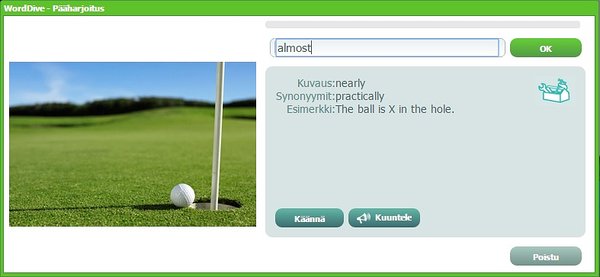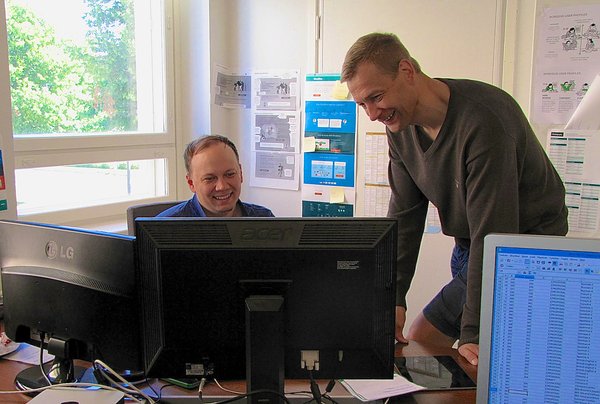WordDive makes language studies addictive
15.9.2015Based in Tampere, Finland, WordDive has harnessed computers in a new way as a tool for anyone wanting to learn a new language or improve skills acquired earlier. The service is currently being used in more than 150 countries. It is based on local research and know-how – and one man’s willingness to overcome the difficulties faced in learning languages.
A language learning software application can be demonstrated the easiest in practice, so WordDive’s CEO Timo-Pekka Leinonen opens his laptop and logs into the WordDive service with a browser. We decide to refresh our American English a bit. A picture appears on the screen, showing a golf ball that has stopped just short of the hole. We now need to know what there is in the picture, and guesses are very welcome.
– People who have a relaxed approach and are ready to try things out will learn better than those who stop to think for longer. We can clearly see this in the results, Leinonen says.
The word we are looking for is not golf, ball or summer, and since we cannot think of anything else right away, we decide to listen to the word and then try typing it. ‘Almost.’ That’s right; the ball in the picture is almost there. To create a deeper memory imprint, we hear an example sentence that states the same.
– What happens is that we activate the student’s working memory 6–11 times using the various senses. The student hears, sees, reads, writes and learns without this starting to feel repetitive, Leinonen says.

Learning foreign languages is a constant and growing need, with people and business moving across borders. Demand increases supply, and there is a large number of various online language learning services available nowadays. WordDive strives to stand out from the rest with its own approach.
– We started out by thinking what the computer can do for the student. It can be a personal instructor that individually optimises the learning instead of just being an ordinary workbook in electronic format.
The WordDive method aims at permanent learning; the basic vocabulary and grammar are imprinted in permanent memory, allowing the student to use the language more confidently. Efficiency, a game-like approach and immediate positive feedback are also among the means utilised by WordDive to get learners addicted.
– WordDive optimises repetitions and monitors progress. When you learn something, you will get new material; quick learners can proceed quickly, and slower learners concentrate on the most important things and repeat them until they learn, Leinonen says.
According to Leinonen, the application finds out about the user’s skills and learning abilities during the first hour and then continues accordingly. Measurement and optimisation take place continuously.

The story of WordDive’s development begins in 1987. It is rooted in Timo-Pekka Leinonen’s desire to learn languages – and the fact that this has always been difficult for him. By contrast, Leinonen’s mother taught Swedish and German for decades. When Leinonen studied software engineering at Tampere University of Technology, he decided to combine his software expertise with his mother’s language teaching experience.
– I personally programmed WordDive’s first three prototype generations, and I also learned languages thanks to them.
A couple of years ago, it started to seem that the time and technology were right for WordDive. The company was established in 2009 and the service launched online the following year. It now has users in more than 150 countries and offers 11 languages, and the intention is to increase the figures even further. Leinonen thinks that intelligent solutions are needed.
– Let’s think about Latin America or China, for example. People are really keen students of English there. There are not enough competent teachers, and the demand is so enormous that many people in Finland can hardly understand it.
One of WordDive’s special user groups is final-year upper secondary school students preparing for the matriculation examination. Dozens of countries have an examination between upper secondary school and university, and in some of them it is truly decisive for the student’s future. WordDive was tested in China in summer 2015 and received good feedback. So that is the place to go?
– China is a highly competed market, so you must go there with a serious attitude and be well-prepared. On the other hand, there are around 10 million new upper secondary school students in China each year. Your market share only needs to be a few per cent in order for the business to be big, Leinonen notes.

WordDive has received several awards during its years of operation, and its annual growth rate as a company has been over 100% from the very beginning. The company continues to seek growth – and will keep its head office in Tampere even in the future. According to Leinonen, the Tampere city region is a good place for growing business. The company has found the international expertise it needs locally, including native language professionals and local game companies.
– We combine humanist expertise and hard technology; that is still important in this company. Both are needed for the creation of added value, Leinonen says.
Translation: Lingoneer
Lue tämä artikkeli suomeksi >